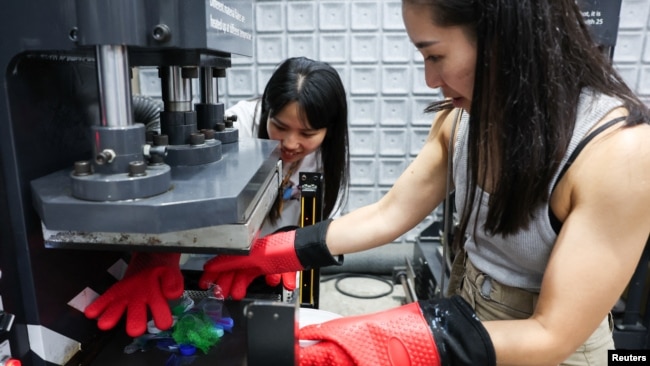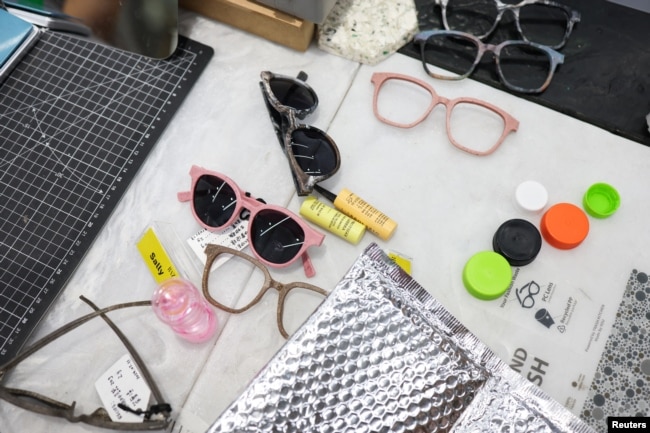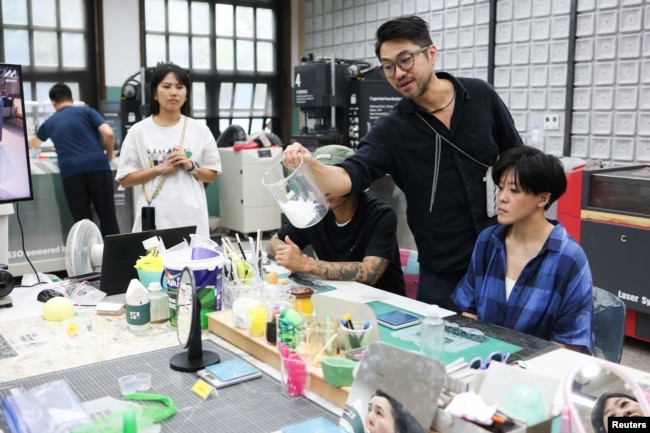台湾の台北に1ヶ月住んでいたことがあります、アパートを借りて。
その時ゴミを捨てのに苦労をしたのを思い出しました。
まず指定ゴミ袋を購入します。ゴミも4種類に分別。その中の資源ゴミはさらに3種類に分けます。ここまでは日本も普通ですよね。
ところがです!!何が大変って、ゴミ置き場が無いのです!!
なので決まった時間に決められた場所に立って、収集車を待つのです。
そして来たゴミ収集車に自分で投げ入れるのです。
収集車は夜にきます。地域により細かく分れていて、私の地区は21時頃でした💦 そんなこともあったなぁと、思い出した次第です。
それはさておき、素晴らしい記事ですね!!
In Taiwan, Turning Trash into Sunglasses
A workshop in Taipei, Taiwan, is giving new life to bottle caps, food packaging, old toys, and other kinds of plastic waste.
The zero-waste workshop known as Trash Kitchen gives people hands-on experience in the recycling process.
People take plastic waste, then soften and shape it into a pair of sunglasses within two hours.
Arthur Huang started the company that holds the workshop. He spoke to Reuters news agency. He said: "What we are trying to show in the Trash Kitchen is to let you see, feel, touch within minutes how this process can actually work without secondary pollution, and you can actually turn it into something of value directly in front of you."
Huang is the founder of Miniwiz. The company recycles waste material into goods that people want to buy. Miniwiz also produces tiles, bricks, hangers and other daily necessities from plastic and organic waste.
Huang said the company uses a machine it developed in 2017 called a "miniTrashpresso." The machine processes the waste material for a new use.
Kora Hsieh is editor-in-chief for fashion magazine Harper's Bazaar Taiwan. Hsieh said the project making sunglasses is a good way to bring attention to sustainable fashion.
"I think environmental protection and fashion still have a long way to go. As for consumers, it is important for them to get first-hand experience, so a workshop like this is very helpful," she said.
People taking part in the workshop said it made them think twice about producing trash and made them pay more attention to reusable goods.
"I have two children. I need to think about their future," said business owner Debbie Wu.
"If you throw away trash without thinking, you kick the problem down the road. So, if everyone can do their best, recycle and use less plastic, that will make a big difference," Wu said.
Data from the Ministry of Environment estimates that Taiwan produced a record 11.6 million metric tons of waste in 2023. More than 6 million tons of that waste was recyclable.
Words in This Story
hands-on –adj. something that is experienced by doing rather than thinking or reading
recycle – v. to process something in order to regain material for human use
fashion – n. the industry that produces and advertises clothes and things that people wear
sustainable – adj. of or relating to a method of harvesting or using a resource so that the resource is not depleted
consumer – n. one that uses economic goods
kick the problem down the road –idiom to put off dealing with a problem to a later time rather than solving it in the present
台湾ではゴミをサングラスに変える(和訳)
台湾の台北にあるワークショップが、ペットボトルのキャップ、食品包装、古いおもちゃ、その他の種類のプラスチック廃棄物に新しい命を与えています。
トラッシュ・キッチンTrash Kitchenと呼ばれる廃棄物ゼロのワークショップでは、リサイクルのプロセスを実際体験hands-on experienceすることができます。
人々はプラスチック廃棄物を手に取り、2時間以内に柔らかくし、サングラスに成形すます。
アーサー・ホアンは氏このワークショップを開催する会社を立ち上げました。彼はロイター通信の取材に話しました。彼はこう言いました: 「私たちがトラッシュ・キッチンで示そうとしているのは、このプロセスが二次的な汚染なしに実際に機能し、実際に目の前で価値のあるものに変えることができることを、数分以内に見て、感じて、触ってもらうことです」
ホアン氏はミニウィズMiniwizの創業者です。同社は廃棄物を人々が買いたいと思う商品にリサイクルしています。ミニウィズMiniwizはまた、プラスチックや有機廃棄物からタイル、レンガ、ハンガー、その他の日用品を生産しています。
同社は2017年に開発した ”miniTrashpresso ”と呼ばれるマシンを使用しているとホアンは氏は言います。この機械は廃棄物を新たな用途に加工します。
コラ・シェー氏はファッション誌 Harper's Bazaar Taiwan の編集長です。シェー氏は、サングラスを作るプロジェクトは持続可能なファッションに注目を集める良い方法だと語っています。
「環境保護とファッションはまだ長い道のりがあると思います。消費者にとっては、実際に体験することが重要なので、このようなワークショップはとても役に立ちます」と彼女は話します。
ワークショップに参加した人々は、ゴミを出すことについて考えさせられ、再利用可能な商品にもっと注意を払うようになったと語っています。
「私には2人の子供がいます。子供たちの将来を考えなければなりません。」と経営者のデビー・ウー氏は言います。
「何も考えずにゴミを捨てると、問題を先送りすることになります。だから、みんながベストを尽くし、リサイクルし、プラスチックの使用を減らすことができれば、それは大きな違いになるでしょう」とウー氏は言います。
環境省のデータによると、2023年の台湾のゴミ排出量は過去最高の1,160万トンに上りました。そのうちの600万トン以上がリサイクル可能な廃棄物でした。


